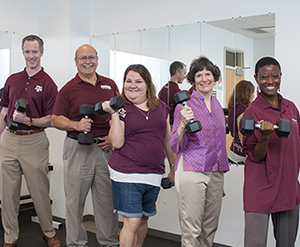Adding more life to your years

What is the secret to aging well? We can’t stop the clock, but how we live and react to different life experiences can make all the difference.
 Regents and Distinguished Professor Marcia Ory, Ph.D., M.P.H., at the Texas A&M Health Science Center School of Rural Public Health, wants the public to know that healthy aging is possible. Ory directs the Program on Healthy Aging that develops and disseminates strategies and programs to help older adults learn self-management skills important for improving their health and quality of life.
Regents and Distinguished Professor Marcia Ory, Ph.D., M.P.H., at the Texas A&M Health Science Center School of Rural Public Health, wants the public to know that healthy aging is possible. Ory directs the Program on Healthy Aging that develops and disseminates strategies and programs to help older adults learn self-management skills important for improving their health and quality of life.
“First, having a positive attitude about aging has been related to better health in old age,” Dr. Ory says. “Think positively about what you can do – not what you can no longer do.”
Dr. Ory recommends keeping socially connected by being close to family or friends or by volunteering. Engaging in healthy lifestyle behaviors, such as being physically active and eating a varied diet of fruits and vegetables, can help reduce chronic diseases that can cause disabilities and lack of independence in later life.
The community you live in can also be a critical factor. Having access to places and programs where you can engage in safe and enjoyable physical activity can make a difference in the lives of older residents.
With statistics indicating that every 15 seconds a senior is being treated at an emergency room for a fall-related injury, one example of a program that benefits seniors significantly are falls prevention programs.
“People realize that when you fall, it may change your life forever, and the fear of falling is a risk factor in itself,” states Ory.
Falls are preventable by knowing what causes them and engaging in exercises that increase strength and balance, having regular eye doctor visits, and making your environment more fall free by improving lighting, removing clutter, and installing grab bars in the bathroom. Medication management is key as well.
Fortunately there are programs that can help older adults manage their falls such as A Matter of Balance courses taught by Texas A&M College of Nursing students. “What we found nationally through a recent evaluation of more than 1,000 people in 22 states is that chronic disease self-management programs not only improve the lives of seniors, but have the potential to save billions of dollars in reduced healthcare costs,” says Ory.
For further information on where these types of programs can be found, contact the Program on Healthy Aging
Media contact: media@tamu.edu


